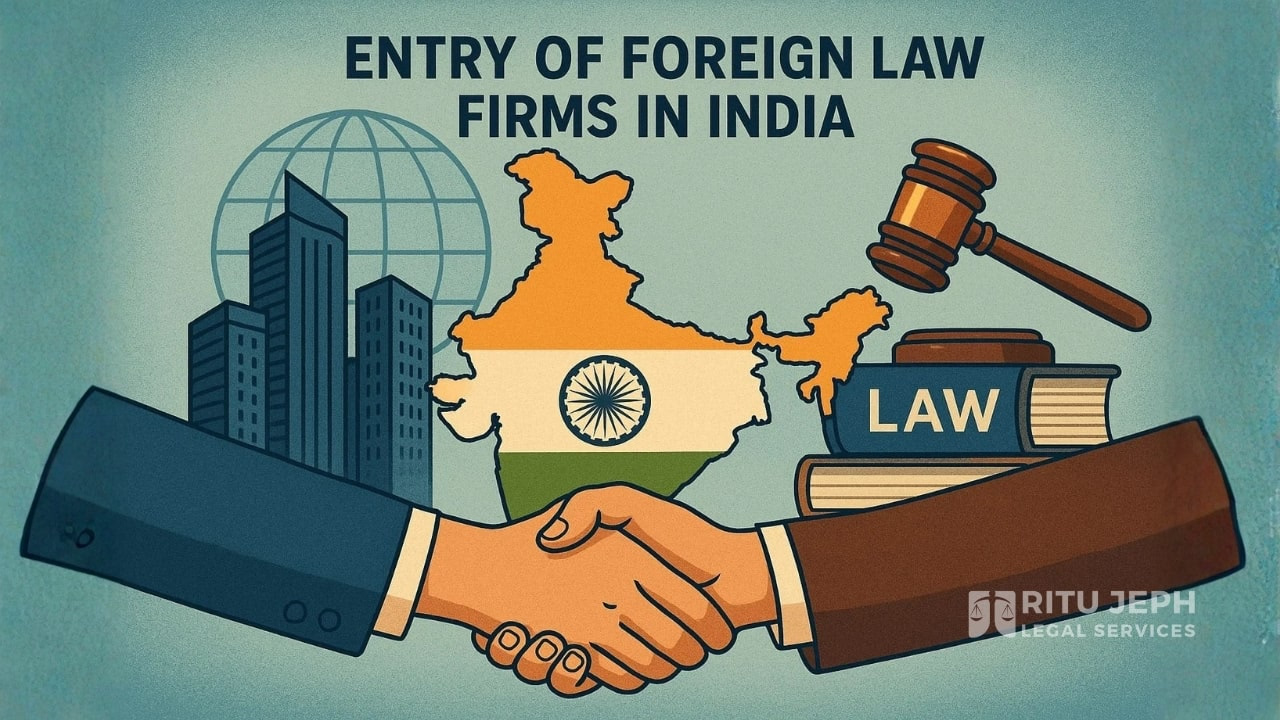Book Appointment Now

The Entry of Foreign Law Firms in India: A Game-Changer for the Legal World
Explore the entry of foreign law firms in India following the Bar Council of India's 2025 decision, including rules, restrictions, and what it means for local lawyers and the market
India’s legal market, worth about $45.2 billion, has long kept foreign law firms out. But things changed in May 2025 when the Bar Council of India (BCI) made a big decision. For the first time, foreign lawyers and firms can now practice in India, though with strict limits. This entry of foreign law firms in India could shake things up, much like how big accounting firms disrupted their field. But why now, and what does it mean for local lawyers? Let’s break it down in simple terms.
The entry of foreign law firms in India started with rules set by the BCI, with a key press release on May 14, 2025. These are called the Bar Council of India Rules for Registration and Regulation of Foreign Lawyers or Foreign Law Firms in India, 2022. The press release explained that foreign lawyers can register with the BCI based on reciprocity—meaning their home country must let Indian lawyers practice there too.
ALSO READ: Delhi High Court’s Take on Misuse of Section 498A in Family Disputes
Before this, foreign firms could only visit briefly for advice, known as “fly-in, fly-out.” They couldn’t open offices or hire Indian staff. Now, with the entry of foreign law firms in India, they can set up here but only for certain work. They can advise on foreign laws, handle cross-border deals, and deal with international disputes if they get a No Objection Certificate (NOC) from the government for arbitration. However, they can’t touch Indian laws, appear in Indian courts, or handle property deals. The BCI made it clear: Indian law stays off-limits to protect local lawyers.
To make the entry of foreign law firms in India happen, they must meet some requirements. They need to show proof of their qualifications from home, a good standing letter, and evidence that their country treats Indian lawyers fairly. They also fill out forms and pay fees to register with the BCI. For short visits, they notify the BCI ahead, share client details (though some worry this breaks privacy), and limit stays to 60 days a year. Critics say 60 days is too short for big deals.
A committee led by Cyril Shroff looked into this and submitted a report recently. Though the full report isn’t public yet, it recommends a step-by-step opening over seven years. In the first three years, foreign firms can’t advise on Indian law or hire locals. Next two years, they can team up with Indian firms but own only up to 49%. In the last two years, the market opens fully—they can hire Indians and advise on Indian law, but not court cases. The committee also wants to ease fly-in rules, like not counting business trips in the 60-day limit, applying the cap to entire firms, and simplifying sharing info without revealing secrets.
As of September 30, 2025, the entry of foreign law firms in India is already underway, but with ongoing talks. In June 2025, the BCI clashed with the Society of Indian Law Firms (SILF), accusing them of blocking changes. SILF denied it and supports fair entry. In August, the UK’s Solicitors Regulation Authority said their lawyers can now work in India under these rules. But in September, the BCI sent notices to some firms about cross-border setups, showing they’re watching closely.
This entry of foreign law firms in India aims for fair play. The committee suggests letting private money into Indian firms and easing ad rules for locals to compete. Why the change? India’s economy is growing fast, with more global deals. Foreign firms bring skills in big international work, which could help Indian businesses. But local lawyers fear job loss or unfair competition, as foreign giants have more resources.
ALSO READ: Maternity Leave in India: Supreme Court’s Landmark Ruling and the Road Ahead
What does the entry of foreign law firms in India mean for everyone? For clients, it could mean better advice on global matters without going abroad. Indian lawyers might gain from partnerships, learning new ways. But there’s worry about big firms taking over non-court work, leaving locals with less. The BCI says this will boost India’s role in world law, like in arbitration.
Looking ahead, this entry of foreign law firms in India is just starting. The phased plan gives time to adjust. Indian firms might grow stronger by teaming up. Overall, it’s a balance—opening doors for growth while protecting home turf.
In short, the entry of foreign law firms in India marks a new chapter. It could disrupt like the Big 4 in accounting, bringing fresh ideas but also challenges. As things unfold, watch for more updates from the BCI.



